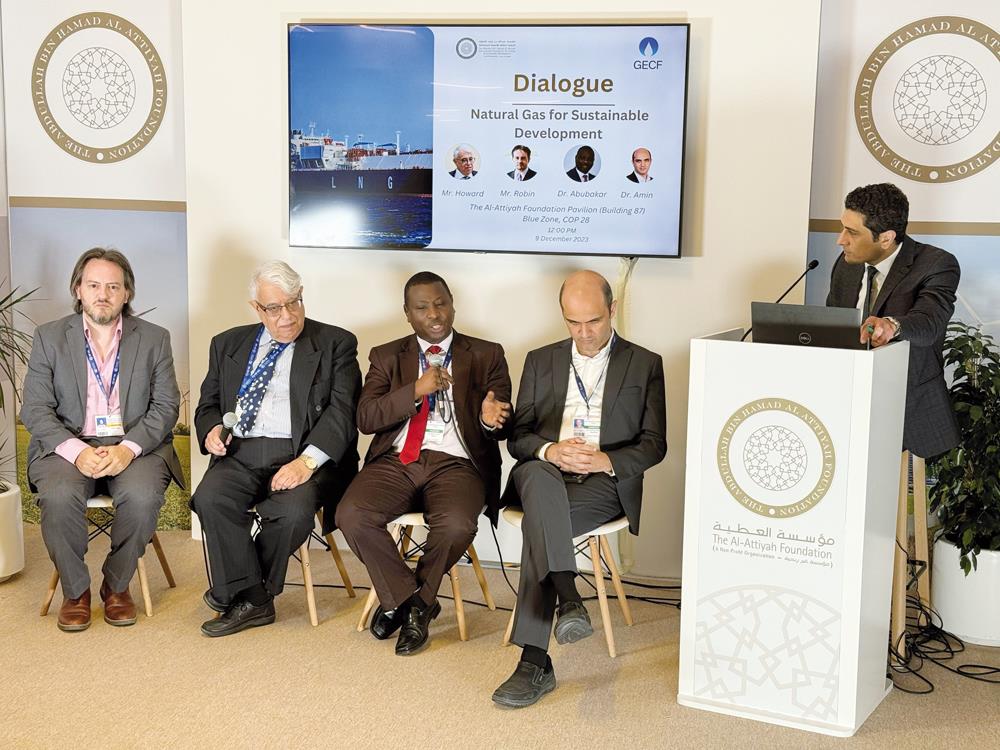
'Natural Gas And Hydrogen To Spearhead Energy Transition'
Doha, Qatar: The important role of natural gas and hydrogen in the energy transition were highlighted by industry leaders and global experts during impactful dialogue sessions and presentations at the Al-Attiyah Foundation pavilion in the 2023 United Nations Climate Change Conference (COP28) in Dubai.
The Foundation's pavilion, located in the Blue Zone, brought together an array of specialists to discuss pertinent energy and sustainability topics for large audiences attending in-person and online.
During an enlightening discussion on the role of natural gas in combating climate change, distinguished speakers Mohammad Amin Naderian and Dr. Abubakar Abbas from the Gas Exporting Countries Forum (GECF), Robin Mills from Qamar Energy and Howard Bevan from the Foundation agreed that producers such as Qatar have a pivotal role to play as countries around the world strive to meet net-zero targets. It was noted that natural gas is versatile, serving as an energy source for all sectors, including heating, cooking, and industrial applications, and produces far fewer greenhouse gas emissions than coal, emitting about half the CO2.
Experts also explained that in the short to medium term, and in conjunction with renewables and carbon capture, utilisation, and storage (CCUS), new natural gas developments can complement the decarbonisation of the energy sector. CCUS is a suite of technologies to capture CO2 from carbon-emitting processes and to store it safely for the long term in underground rock formations or convert it into useful products or stable minerals.
According to a United Nations Economic Commission for Europe (UNECE) report, CCUS offers a real prospect for natural gas to work with renewable energy sources on decarbonisation, helping to address the problem of how to cope with hard-to-abate emissions from heavy industry, notably steel, cement, and petrochemicals.
Earlier this year, QatarEnergy outlined pioneering plans to scale up its CCUS and solar power generation capabilities as part of its drive to significantly reduce the carbon footprint at its facilities. In an update of its sustainability strategy, QatarEnergy revealed it will develop“carbon capture and storage technology to capture over 11mn tonnes per annum of CO2 in Qatar by 2035.”
On day four of the conference, the Foundation welcomed Nimir Elbashir from Texas A&M University in Qatar and David Hart from ERM to share their expert insights on hydrogen and its role in the energy mix in the coming decades. Hydrogen, the lightest and most abundant element in the universe, can be used for a wide range of applications, including power generation, energy storage, and transportation (particularly heavy transportation such as shipping and trucking).
Hydrogen is also a possible method of obtaining high levels of process heat for some industries such as steel and cement and an essential intermediary in the petrochemical industries.

Legal Disclaimer:
MENAFN provides the
information “as is” without warranty of any kind. We do not accept
any responsibility or liability for the accuracy, content, images,
videos, licenses, completeness, legality, or reliability of the information
contained in this article. If you have any complaints or copyright
issues related to this article, kindly contact the provider above.


















Comments
No comment